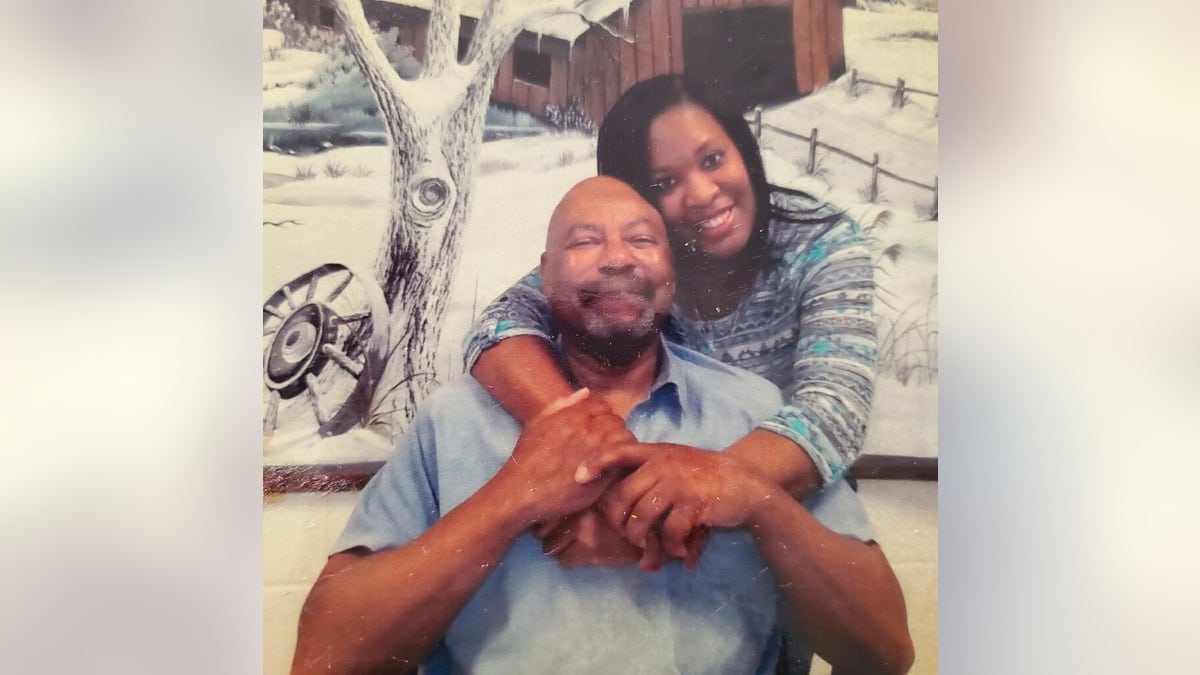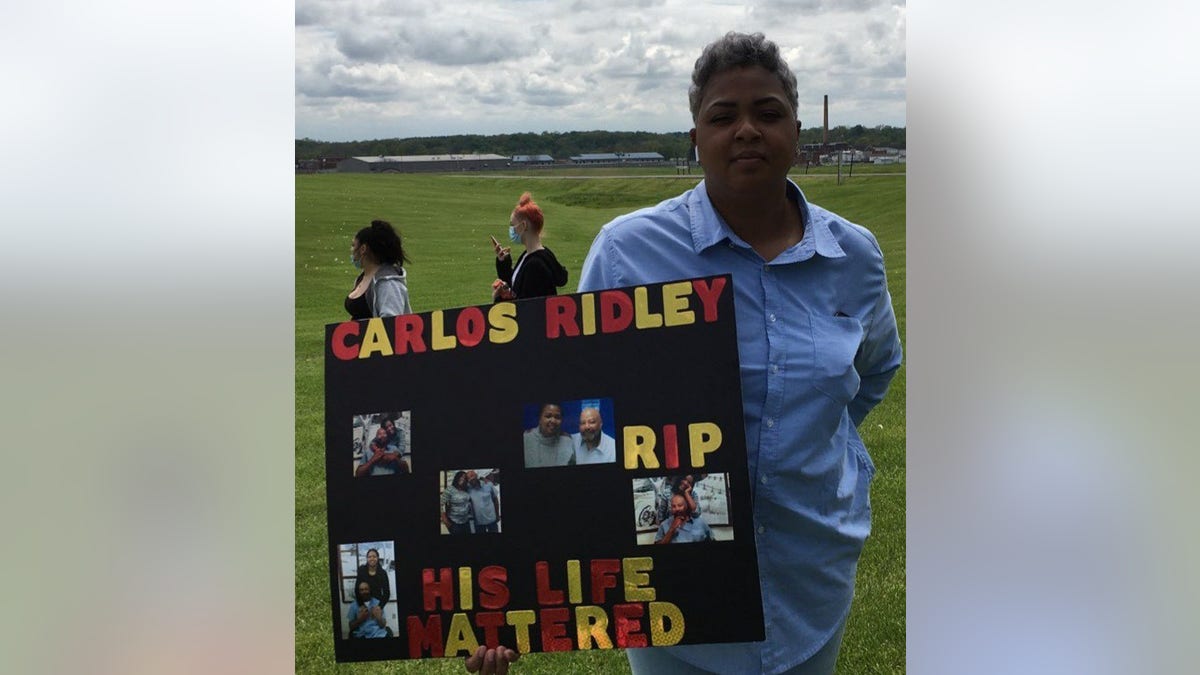Fox News Flash top headlines for May 20
Fox News Flash top headlines are here. Check out what's clicking on Foxnews.com.
Get all the latest news on coronavirus and more delivered daily to your inbox. Sign up here.
An Ohio prison inmate who for decades sought exoneration from his murder convictions contracted coronavirus in prison and died earlier this month at the age of 69.
Carlos Ridley had spent nearly four decades incarcerated in the Buckeye State's Pickaway Correctional Institution after he was convicted in a spate of murders in the town of Lima. Ridley and his family have long maintained his innocence in the killings, which left three dead.
Over the 39 years of his incarceration, Ridley beat colon and prostate cancer and had a hip and knee replaced. His health had been in decline in recent years, and he was wheelchair-bound when he was infected with the coronavirus -- which has spread throughout Ohio's prison system in recent weeks.

LaTonya Ridley and her incarcerated father, Carlos, who contracted COVID-19 and died while seeking exoneration.
Despite his ailing health and decades behind bars, Ridley and his family maintained hope. His daughter, LaTonya, said he never stopped fighting to get home to his grandchildren.
“He lost his mother, his wife, his sisters,” Latonya told Fox News. “He lost his freedom, and he lost the chance to raise his daughters. ... He tried to fight to get home to us. He loved his grandkids, he loved them so much.”

Carlos Ridley's daughter, Kenosha Hines, protesting her father's death in ODRC custody.
Ridley’s appeal had been delayed by a technicality. A judge in Ohio’s third district did not believe the court had the authority to submit DNA from Ridley’s case into the state’s database to see if it identified someone else and exonerated him. That holdup occurred despite the fact two other judges previously ruled DNA could be submitted.
Donald Caster, who represents Ridley through the Ohio Innocence Project (OIP) and is a law professor at the University of Cincinnati, said he was preparing to present Ridley’s case, and the contradictions between the courts, to the Supreme Court of Ohio. He’s confident that the state’s highest court would’ve granted DNA testing in Ridley’s case, which may have exonerated his client.
Caster said he's in the process of getting court permission to continue litigating Ridley's exoneration posthumously.
“I came away with a firm impression that this was not a person that committed multiple murders,” Caster said. “… We were hopeful, even after we lost, we were hopeful that the Supreme Court would take that case and resolve it in Mr. Ridley’s favor.”
If his case had been successful, Ridley would’ve joined a list of over 100 who have been exonerated in the state since 1989, according to the National Registry of Exonerations.
“Unfortunately, I think that there are people in our government, and in all governments in the United States, who are convinced and want to convince us that prisoners are too scary to be compassionate towards,” Caster told Fox news.
Caster said that if you’re a prisoner in Ohio, you’re 10 times more likely to die from COVID-19 than if you’re not, a percentage that’s only grown with the deaths in the system. The ODRC’s numbers bear out that math, though it’s impossible to project the number of dead in a system still grappling with controlling the virus.
“The story of Carlos Ridley illustrates how inadequate the state’s response to the COVID pandemic in Ohio’s prison system has been. Mr. Ridley’s family tells a story of an utterly confused response to his illness."
"Any loss of life is something the ODRC [Ohio Department of Rehabilitation and Correction] takes very seriously and our condolences go out to the families and loved ones of the incarcerated men who have died as a result of COVID-19," JoEllen Smith, an ODRC spokeswoman, told Fox News.
She also said there is no change in policies or protocols regarding inmate treatment if that inmate is seeking exoneration for wrongful conviction and incarceration.
Ridley is one of 66 who has died after contracting COVID-19 in an ODRC facility. At least three are staffers, and at least two inmates were in legal proceedings to try and prove their innocence and secure their exoneration. Over 4,500 have tested positive for the virus and more than 40,000 are in quarantine, according to ODRC statistics.
“The story of Carlos Ridley illustrates how inadequate the state’s response to the COVID pandemic in Ohio’s prison system has been,” Piet van Lier, a researcher at Policy Matters Ohio, told Fox News. “Mr. Ridley’s family tells a story of an utterly confused response to his illness.
“This is yet more proof that what we’ve been hearing from incarcerated people and prison staff about lack of appropriate medical care, PPE, and effective isolation is accurate. In short, the state’s response to the crisis in prisons has been a disaster that has now resulted in 65 deaths,” he continued.
Waiting for a chance at DNA Exoneration
Across America, others are seeking a chance to prove their innocence with DNA. Jermane Scott is a 43-year-old Ohioan who said he’s been wrongfully incarcerated for 24 years.
Scott’s case has been taken up by undergraduate students at Georgetown University involved in the Prison Reform Project course. The class, taught by government and law professor Marc Howard, focuses on investigating the cases of and advocating for the exoneration of inmates who they believe have been wrongfully convicted.
Students in the course famously helped exonerate Valentino Dixon, a New York man whose story and artistic prowess drew national attention.
Scott was sentenced to life without parole for aggravated murder and forgery in 1996 when he was 19 years old. He readily admits to using the credit card but has maintained his innocence for the murder he was convicted of.
“The police had more valuable suspects than myself, but due to the credit card usage, I was deemed the killer. … There’s just no way humanly possible I committed this crime.”
“The police had more valuable suspects than myself, but due to the credit card usage, I was deemed the killer,” Scott said in the forthcoming Georgetown student’s documentary project. “… There’s just no way humanly possible I committed this crime.”
Scott said he never met the victim, a 55-year-old man, and that his guilt was predicated on the testimonies of two witnesses who were suspected of being involved in the murder. Howard said his case bears the hallmark pattern of poor police work and a lack of due diligence.
CORONAVIRUS: WHAT YOU NEED TO KNOW
“The common factor in so many wrongful convictions, and I now know the stories of hundreds of them, once they fixate on somebody there’s no going back. It’s just digging the heels in,” Howard said. “You see this pattern happening way too much. Almost every proven case of wrongful conviction has a pattern of misconduct."
“You see this pattern happening way too much. Almost every proven case of wrongful conviction has a pattern of misconduct."
The investigation conducted by students in Howard’s class shows a serious of crucial errors or omissions in the initial investigation that Howard believes would’ve shown Scott’s innocence.
Scott said police never made contact with the woman who could corroborate his alibi for the night of the murder. Furthermore, police failed to test fingerprints found in the victim’s car and home against any suspect besides Scott. All the prints came back negative for Scott, according to the video.
There were also inconsistencies between the official date of death, initially left blank on the autopsy, and when a neighbor said he last saw the victim alive. All of this, Howard said, puts Scott’s case in the rare territory of both being plausible and verifiable and providing a legal pathway to exoneration.
Scott still doesn’t have legal representation, though he said he’s reached out to the Ohio Innocence Project. Howard believes the work of his students will do well to provide a strong baseline of investigation and elevate Scott’s case to the attention of the OIP or another firm who will work it pro bono.
“I really feel strongly that he’s someone we should believe in,” Howard said. “… I would love for the Ohio Innocence Project to embrace that.”
CLICK HERE TO GET THE FOX NEWS APP
Advocates in Ohio said exposure to COVID-19 only added zeros to the magnitude of injustices faced by those wrongfully convicted and incarcerated in the state’s prison system.
“The tragedy of Mr. Ridley is further compounded by the fact that he was in the process of trying to prove his innocence, and was being stopped yet again when he died,” van Lier said. “Careful consideration must be given now to anyone who is at low risk to re-offend or at high risk for contracting the disease. These cases just show why we have to understand that a prison sentence isn’t a death sentence.”










































